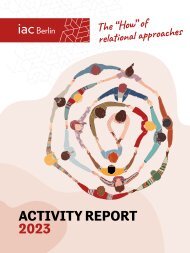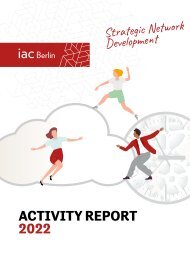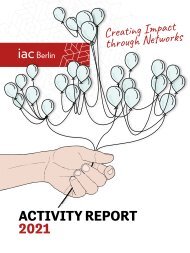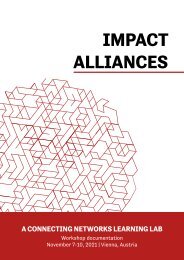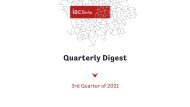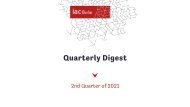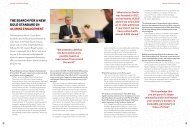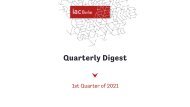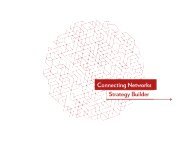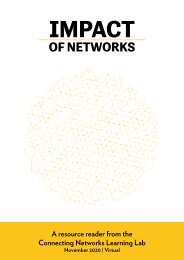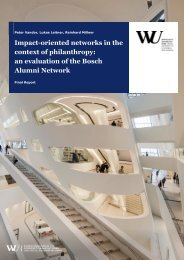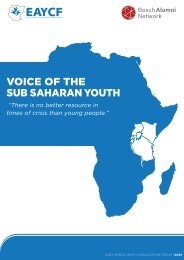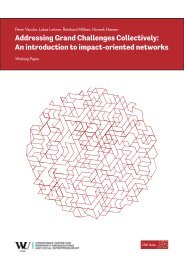iac Berlin - Activity Report 2020
iac Berlin - Activity Report 2020
iac Berlin - Activity Report 2020
Create successful ePaper yourself
Turn your PDF publications into a flip-book with our unique Google optimized e-Paper software.
Academic Evaluation of the Bosch Alumni Network<br />
Academic Evaluation of the Bosch Alumni Network<br />
MEASURING THE SUCCESS OF<br />
IMPACT-ORIENTED NETWORKS<br />
Key actors<br />
Enable jointly<br />
Network structure<br />
and interaction<br />
Interaction<br />
3 years after the launch of the Bosch Alumni Network, we initiated a substantive<br />
evaluation in cooperation with the Vienna University of Economics and Business. The<br />
aim was to create an academic assessment of the approach in building the network, its<br />
impact and potential for further development.<br />
Network<br />
Members<br />
<strong>iac</strong><br />
<strong>Berlin</strong><br />
Robert<br />
Bosch<br />
Stiftung<br />
Network<br />
structure<br />
When being on a journey that’s not minutely waymarked,<br />
regularly checking your compass should be a routine.<br />
Founded in 2017, the Bosch Alumni Network’s mission has<br />
been to bring together former and current fellows, grantees<br />
and staff members of the Robert Bosch Stiftung and its<br />
partners. It should connect network members with common<br />
interests and different backgrounds to foster cross-sectoral<br />
exchange and international collaborations that eventually<br />
support the members in their societal work.<br />
3 years after its launch, it was about time to double-check<br />
our compass and assess if we were still on track in regard<br />
to this mission. Together with the Vienna University of<br />
Economics and Business, we reviewed the network and its<br />
activities and looked for qualitative as well as quantitative<br />
waymarks.<br />
Central questions that guided the research included:<br />
» What can be key metrics to map an impact-oriented<br />
network?<br />
» What factors on the member, network and architectural<br />
level leverage impact?<br />
» Can we improve the evaluation of impact-oriented<br />
networks by using a circular approach?<br />
Peter Vandor, Lukas Leitner and Reinhard Millner of the<br />
Vienna University of Economics and Business’ Social<br />
Entrepreneurship Center compiled an extensive, 100-pagesreport<br />
based on an online survey completed by 634 network<br />
members, 13 background interviews, 22 member interviews,<br />
participatory observations, as well as the systematic review<br />
of organizational documents and scientific literature.<br />
Circular impact made visible<br />
Some outcomes for the Bosch Alumni Network were:<br />
» Overall, alumni voluntarily invest 5,920 hours per month<br />
to network activities, which accounts to around 37 full time<br />
positions.<br />
» 65% of participants specified that their membership has<br />
assisted them or their organization in building credibility<br />
towards others.<br />
» Almost half of the interviewed employees of the Robert<br />
Bosch Stiftung reported that they had received support<br />
from the network in building a new project, venture or idea.<br />
Furthermore, the evaluation showcases that the impact of the<br />
Bosch Alumni Network can best be understood as a selfenhancing<br />
(i.e. circular) model as opposed to the standard<br />
linear model used in many conventional impact assessment<br />
frameworks. The report details out how outcomes on the<br />
member, network and societal levels are re-incorporated into<br />
the network to strengthen key actors and promote learning.<br />
Thus, influential assets in the network – individuals, structures,<br />
etc. – are being continuously developed and optimized as<br />
they work from within to further develop the network.<br />
“I really appreciate the possibilities and opportunities<br />
that the network offers. Thank you!”<br />
“Keep up the good work. The Bosch Alumni Network<br />
is a great undertaking. It is all about balance and<br />
fighting through social media saturation, especially<br />
now, during a very stressful time.”<br />
PARTICIPANTS' FEEDBACK IN THE SURVEY<br />
Feedback effects<br />
Social<br />
impact<br />
Increased efficacy of<br />
impact-oriented work<br />
Collaboration and<br />
Innovation<br />
Strengthening civic<br />
resilience<br />
Field building<br />
The evaluation “Impact-oriented Networks in the Context of<br />
Philanthropy: An Evaluation of the Bosch Alumni Network”<br />
explains the used methodology, depicts the findings, includes<br />
additional literature, and provides an in-depth look inside<br />
the Bosch Alumni Network. It explores the perspective of<br />
the community and converts the results in tangible numbers<br />
where possible. The results highlight the role of the Bosch<br />
Alumni Network as an “active memory” and “idea laboratory”.<br />
Last but not least, the evaluation proves the Bosch Alumni<br />
Network is on track, is pursuing its mission and has room for<br />
further growth.<br />
Enables<br />
Direct<br />
benefits<br />
Building knowledge<br />
Accessing resources<br />
and opportunities<br />
Gaining legitimacy<br />
Social support<br />
Enables<br />
Enables<br />
www.<strong>iac</strong>-berlin.org/resources/how-to-measure-thesuccess-of-impact-oriented-networks<br />
36<br />
37




